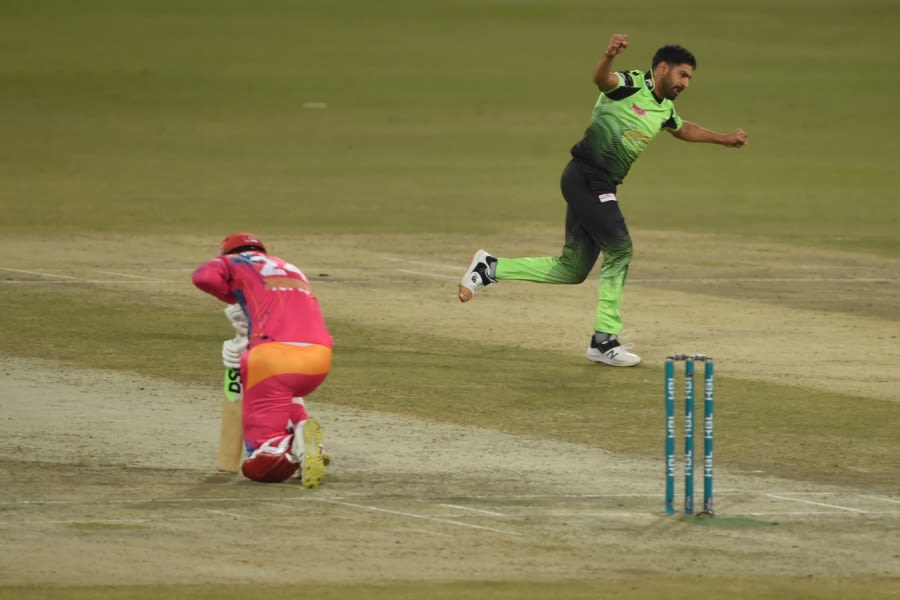PSL
Wiese’s all-round heroics put Lahore Qalandars in PSL final

Having smacked 28 off 8, he sealed victory by bowling the final over of a seesawing thriller
Lahore Qalandars 168 for 7 (Shafique 52, Ghulam 30, Wiese 28*, Dawson 2-24) beat Islamabad United 162 all out (Azam 40, Hales 38, Rauf 2-31) by 6 runs
It was a contest of data against vibes, and at a packed Gaddafi stadium where the vibes were overwhelmingly pro-Lahore, Lahore Qalandars pulled a rabbit out of the hat to stun Islamabad United by six runs and book themselves a final berth. Chasing 169, Islamabad United looked well on course for much of their innings, spearheaded by a 79-run partnership for the fifth wicket between Alex Hales and Azam Khan.
But quick wickets at the death saw United lose their nerve, and Lahore crept back into the contest by stealth. With seven required off three balls, United’s No 11 Waqas Maqsood smashed one in the direction of wide long-on. Abdullah Shafique held on to the catch, inches short of the boundary, and as the heavens opened, it really felt like the Qalandars’ PSL title drought might finally be coming to an end.
How United found themselves in that position may well be pored over by the side for hours afterwards. They needed 39 off the last five, and were effectively coasting to their target. Oddly, however, the Qalandars had defended exactly that equation in one of these two sides’ group games, and when Haris Rauf removed Hales, there was the faint hope that history might repeat itself, even though Lahore were sloppy – a Shaheen Afridi no-ball denied him a wicket and Asif Ali smashed one from Rauf right in the slot for six to make the equation 10 off 10.
A fateful decision from Asif, however, to try and take on Haris off the final ball of the penultimate over when retaining the strike seemed the obvious call led to his downfall, and the Qalandars were back in it.
The decision-making grew only more puzzling from thereon. Mohammad Wasim refused singles off the first two balls of the final over to make it eight off four, and then tried to come back for a suicidal second, leaving the game at the mercy of Maqsood at No 11. He nearly did send the only ball he faced over cow corner, but he, and United, would end up inches short. David Wiese, and his side celebrated maniacally in the rain, and a capacity crowd joined them in the crazed frenzy.

And all this in a game where the Qalandars had for so long seemed to be dancing to United’s tunes. They opted to bat first upon winning the toss – Shadab Khan pointedly said he would have bowled anyway with some rain forecast – and then slumped to 9 for 2 inside four overs, losing Fakhar Zaman and Phil Salt to a superb opening spell from Liam Dawson. A magnificent rearguard from Abdullah Shafique and Kamran Ghulam – they would add 73 off 42 balls – brought the Qalandars back into the contest. There was an elegant violence to Shafique’s 28-ball 52, so seamlessly did he switch from classical shotmaking to brute-force hitting, and for a while, United’s attack looked to have been beaten back.
That couldn’t continue endlessly, and United struck back hard. Shadab Khan deceived Ghulam in the flight to break the partnership, and took a lovely catch off Maqsood’s bowling to remove Shafique, while some self-destructive running put paid to Harry Brooks. Qalandars slumped along to 141 in 19 overs, before, pricelessly, their perpetual saviour Wiese bludgeoned 27 off the final over to give his side something to bowl at.
It was time for Qalandars’ star-studded bowling line-up to stand up, and that is what they did. The returning Paul Stirling fell to a stunning catch from Rauf off Shaheen Shah Afridi’s bowling, and Hales was starved of the strike, facing just eight balls in the powerplay. At the other end, Lahore continued to chip away, and before the powerplay was out, Will Jacks, Shadab Khan and Liam Dawson had all fallen.

Just as yesterday, however, Hales and Azam played vital knocks to keep United in the hunt. Azam smashed a four and a six off Mohammad Hafeez’s only over, while Hales dealt the same treatment to Samit Patel as United began to break the back of the chase. Qalandars briefly lost their discipline in the field.
Three consecutive balls saw, in the following order: a Hales drop that went for six, five wides, and another Hales drop, suddenly making the equation a very favourable 55 off 47 with six wickets in hand.A sloppy run-out to get rid of, predictably, Azam, brought Qalandars back into the contest, before a smart catch from Ghulam finally removed Hales.
Suddenly, the Qalandars were sneaking into the United tail, though a poor final over from Shaheen put United back in pole position. Zaman Khan, who has had a breakout tournament, dismissed Hasan Ali as he tried to go for a six, and the game would go the distance.The second innings would end as the first did, with Wiese trying to drag back this enigmatic Qalandars side into the contest.
In a lot of ways, it’s felt like this South African-Namibian allrounder has personified Qalandars’ struggles these last few years, from their mesmeric brilliance to depressing listlessness. The joy on his face as Shafique took that final catch, though, suggested he wouldn’t change it for the world.
For United, though, a tournament in which they had little right to go as deep as this, given the injuries they’ve endured, would end with a fourth successive season without a final berth. For the side that extols the virtues of six-hitting to an almost messianic extent, it was perhaps appropriate that they fell short by precisely that number.

Cricket
PSL 9 Final: Clash of Titans – Multan Sultans vs. Islamabad United

Table of Contents
Introduction
The Pakistan Super League (PSL) has reached its thrilling climax, and cricket fans are eagerly awaiting the final showdown between the Multan Sultans and Islamabad United. As the two teams battle it out on the field, let’s delve into the stats, strategies, and key players to determine who has the edge in this high-stakes clash.

Recent Encounters
Before we analyze the teams, let’s revisit their recent encounters:
- Match 27 (March 10, 2024): Islamabad United vs. Multan Sultans
- Venue: Rawalpindi Cricket Stadium
- Result: Islamabad United won by 3 wickets
- Player of the Match: Colin Munro (IU)
- Summary: Multan Sultans posted a formidable 228/4, but Islamabad United chased down the target with Munro’s explosive 84 off 40 balls1.
- Match 5 (February 20, 2024): Multan Sultans vs. Islamabad United
- Venue: Multan Cricket Stadium
- Result: Multan Sultans won by 5 wickets
- Player of the Match: M. Ali (MS)
- Summary: Multan restricted Islamabad to 144, and their batsmen secured a comfortable victory2.
Key Players
Let’s spotlight some standout performers from both teams:
Multan Sultans
- Usman Khan: The explosive opener has been in scintillating form, scoring back-to-back centuries. His unbeaten 100 against Islamabad United was a masterclass.
- Mohammad Ali: The left-arm pacer has consistently troubled opposition batsmen. His 3-wicket haul in the last encounter was crucial for Multan.
Islamabad United
- Colin Munro: The hard-hitting New Zealander is a game-changer. His 84 in the previous match powered Islamabad’s run chase.
- Shadab Khan: The skipper’s all-round abilities make him a vital cog in the United lineup.
Conclusion
The PSL 9 final is a battle of skill, nerves, and determination. Whether it’s the Sultans’ power-packed batting or United’s balanced lineup, cricket fans are in for a treat. Buckle up for an exhilarating showdown as we await the crowning of the PSL 9 champion! 🏏🏆
Sports
PCB’s Musical Chairs: How it’s Harming Pakistan’s Cricket

Table of Contents
Introduction
Pakistan Cricket Board (PCB), the governing body for cricket in Pakistan, plays a crucial role in shaping the country’s cricketing future. However, in recent times, the PCB has been caught in a perplexing cycle of musical chairs with its leadership and coaching staff. This constant shuffling of personnel and inconsistent decision-making have had a detrimental impact on Pakistan’s cricketing progress. In this SEO-optimized blog article, we will delve into the negative consequences of PCB’s musical chairs and explore how it has harmed Pakistan’s cricketing prospects.

Lack of Continuity and Stability
One of the major downsides of the constant personnel changes in the PCB is the lack of continuity and stability it brings. The frequent hiring and firing of coaches, captains, and selectors disrupt the team’s dynamics and undermine player confidence. With every new appointment, the team goes through a period of adjustment, affecting their performance on the field. This lack of stability also hampers long-term planning and development of players, as there is no consistent vision or strategy in place.
Inconsistent Team Selection
The revolving door of selectors within the PCB has resulted in inconsistent team selection, further damaging Pakistan’s cricket. Different selectors have varying preferences, biases, and strategies, which leads to a lack of coherence in the team composition. Players are often dropped or included based on short-term considerations rather than a comprehensive assessment of their skills and potential. Such inconsistent team selection not only affects player morale but also undermines the team’s ability to perform consistently at the international level.
Disrupted Player Development
PCB’s musical chairs have a detrimental impact on the development of young and talented players in Pakistan. With frequent changes in coaching staff, players find themselves adapting to new coaching methods and philosophies, disrupting their growth and progress. The lack of a stable coaching structure denies players the opportunity to build long-term relationships and benefit from consistent guidance. As a result, promising talents often fail to reach their full potential, and the overall pool of skilled players in Pakistan suffers.
Communication and Trust Issues
The constant changes in leadership within the PCB have given rise to communication and trust issues among players, coaches, and board officials. When there is a lack of stability and a sense of insecurity, players may hesitate to communicate openly or express their concerns, fearing repercussions or uncertainty. Effective communication and trust are crucial for building a cohesive team environment and addressing challenges effectively. The musical chairs culture within the PCB erodes this essential foundation, hindering the team’s ability to perform at its best.
Conclusion
The PCB’s musical chairs approach, characterized by frequent changes in leadership and coaching staff, has proven to be detrimental to Pakistan’s cricketing landscape. The lack of continuity, inconsistent team selection, disrupted player development, and communication issues have collectively harmed the progress of the national cricket team. To regain stability and foster long-term growth, the PCB needs to prioritize a strategic and sustainable approach, appointing leadership and coaching personnel with a long-term vision. A stable and supportive environment will enable players to focus on their game, improve their skills, and contribute to Pakistan’s success on the international cricket stage. It is crucial for the PCB to break free from the cycle of musical chairs and lay the foundation for a brighter future for Pakistani cricket. The board needs to stop appointing new management on a whim and find a group of people who can work together effectively and build a long-term plan for the team. This is the only way to ensure that Pakistan cricket can return to its former glory.
-

 Featured3 years ago
Featured3 years agoThe Right-Wing Politics in United States & The Capitol Hill Mayhem
-

 Elections 20242 months ago
Elections 20242 months agoAnalyzing Trump’s Super Tuesday Triumph and Nikki Haley’s Strategic Moves
-

 News2 years ago
News2 years agoPrioritizing health & education most effective way to improve socio-economic status: President
-

 China3 years ago
China3 years agoCoronavirus Pandemic and Global Response
-

 Canada3 years ago
Canada3 years agoSocio-Economic Implications of Canadian Border Closure With U.S
-

 Conflict3 years ago
Conflict3 years agoKashmir Lockdown, UNGA & Thereafter
-

 Democracy3 years ago
Democracy3 years agoMissing You! SPSC
-

 Democracy3 years ago
Democracy3 years agoPresident Dr Arif Alvi Confers Civil Awards on Independence Day























